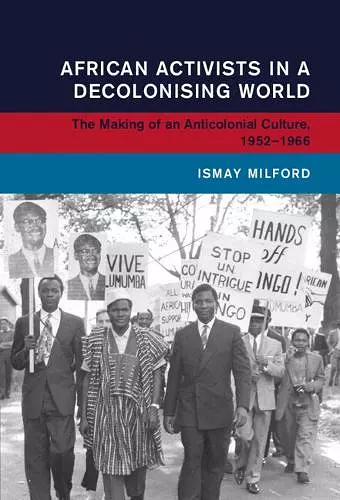African Activists in a Decolonising World
The Making of an Anticolonial Culture, 1952–1966
Format:Hardback
Publisher:Cambridge University Press
Published:9th Mar '23
Currently unavailable, and unfortunately no date known when it will be back
This hardback is available in another edition too:
- Paperback£29.99was £29.99(9781009277037)

A history of global decolonisation and anticolonialism, told through East and Central African activists in the 1950s and 1960s.
Through the perspective of activists from East and Central Africa, Milford presents a history of global decolonisation and anticolonialism in the 1950s and 1960s. Drawing on multi-archival research, she foregrounds the role of these activists in transnational networks and the limits of the solidarity projects in which they participated.As wars of liberation in Africa and Asia shook the post-war world, a cohort of activists from East and Central Africa, specifically the region encompassing present-day Malawi, Zambia, Uganda and mainland Tanzania, asked what role they could play in the global anticolonial landscape. Through the perspective of these activists, Ismay Milford presents a social and intellectual history of decolonisation and anticolonialism in the 1950s and 1960s. Drawing on multi-archival research, she brings together their trajectories for the first time, reconstructing the anticolonial culture that underpinned their journeys to Delhi, Cairo, London, Accra and beyond. Forming committees and publishing pamphlets, these activists worked with pan-African and Afro-Asian solidarity projects, Cold War student internationals, spiritual internationalists and diverse pressure groups. Milford argues that a focus on their everyday labour and knowledge production highlights certain limits of transnational and international activism, opening up a critical – albeit less heroic – perspective on the global history of anticolonial work and thought.
'An ambitious book, courageous and persuasive in advancing an argument derived from the very limitations encountered by its main protagonists. Far from crafting an alternative, transnational heroic narrative by lionizing these 'secondary' actors, often sidelined in nationalist histories, Milford uses their experiences and failures to offer us a better understanding of agency and thought in the shifting sands of imperial endgames. The book thus challenges us to grapple with the history of decolonization in microspatial ways and acknowledge the changing forms, frequent failures, and fractured globality of anticolonialism.' Eric Burton, H-Soz-Kult
'I approached this book with some trepidation, not because it didn't look like a well-written, exceptionally well-researched text, but because I find anti-colonial nostalgia is the worst nostalgia there is … I didn't have to worry. Ismay Milford gives us a very different book … There's not another study like this book, of this period and the kinds of men who tried desperately to shape it. That's a major contribution from any monograph.' Luise White, The Global Sixties
'Milford's exciting monograph underscores how thinking regionally can open up historical work on transnational anticolonialism in African contexts … 'African Activists' elucidates the importance of regional networks to transnational anticolonial efforts. The text represents a critical addition to literature on Africa's global history and the Cold War and decolonization.' Yasmina Martin, H-Diplo Roundtable XXVI-14
'In its richness and innovation, Milford's book is a tour de force that challenges historians' spatial understandings of African anticolonialism and decolonization, enriches scholars' appreciation of the role of generation in the continent's anticolonial politics, and offers a deep and diverse dive into the continent's decolonization-era and postcolonial archives.' Jeffrey Ahlman, H-Diplo Roundtable XXVI-14
'This book is a timely publication, not only for historical studies but also for discourses on the Cold War, politics, and global historical discourses. It takes the study of African history ahead of time by adopting current trends that consider local forces not as markers of disconnected historical dynamics but rather as constitutive parts of bigger global waves that influence one another in time and space. It is my hope that students and the general interested public will find book to be a necessary read and addition to their book shelves.' Maxmillian Chuhila, H-Diplo Roundtable XXVI-14
ISBN: 9781009276993
Dimensions: 235mm x 155mm x 23mm
Weight: 590g
316 pages